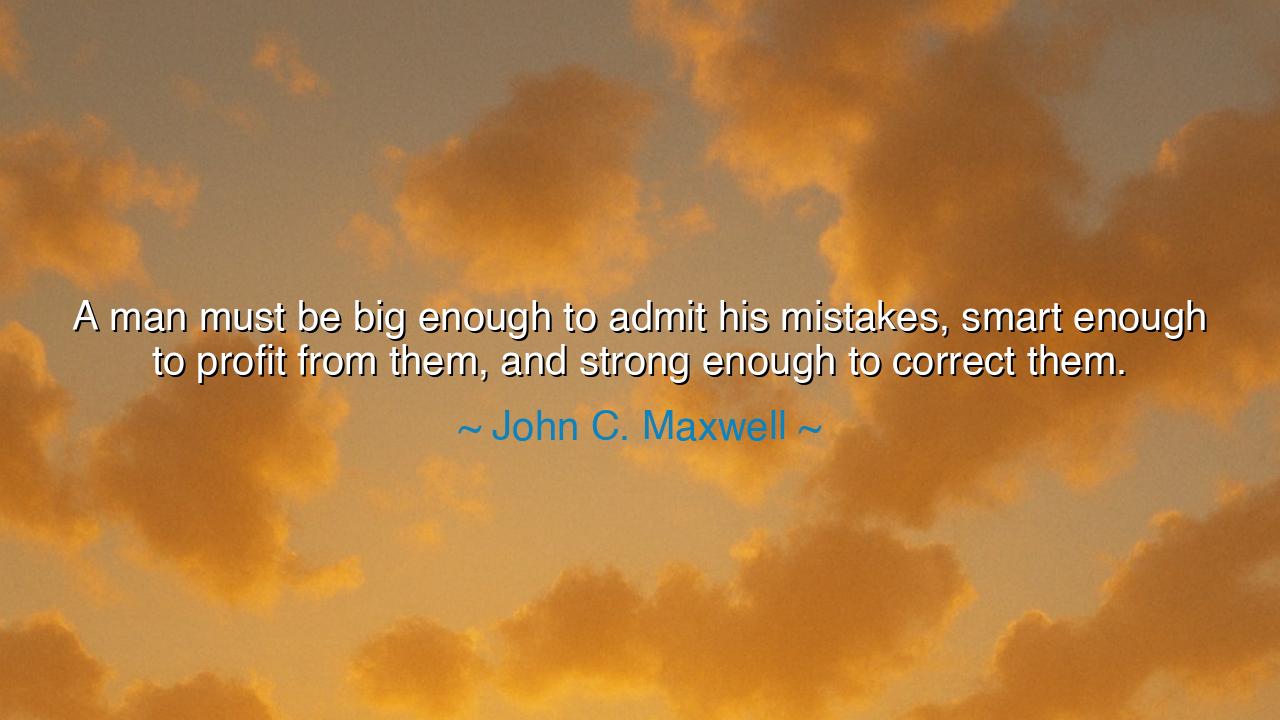
A man must be big enough to admit his mistakes, smart enough to
A man must be big enough to admit his mistakes, smart enough to profit from them, and strong enough to correct them.






The words of John C. Maxwell, “A man must be big enough to admit his mistakes, smart enough to profit from them, and strong enough to correct them,” thunder like the counsel of a seasoned elder. They speak to the eternal struggle of pride, folly, and redemption. To err is the lot of all men, but to rise above error is the mark of greatness. One must have the humility to confess fault, the wisdom to draw lessons from it, and the courage to set it right. Without these three, a man is enslaved to his failures; with them, he becomes master of his destiny.
The ancients knew this law well. The philosopher Aristotle taught that virtue is not the absence of error, but the moderation and discipline that follow after it. The Stoics proclaimed that no man can avoid stumbling, but that the wise rise stronger from each fall, as iron tempered by fire. Maxwell’s triad of humility, wisdom, and strength echoes these timeless teachings: mistakes are not tombstones, but stepping stones, if only one dares to use them so.
History shines with examples of those who lived by this truth. Abraham Lincoln, in his early years, lost elections, failed in business, and stumbled repeatedly in politics. Yet he was big enough to admit his errors, smart enough to learn from them, and strong enough to rise again. These very failures carved the resilience and insight that made him the leader who could guide a nation through its darkest trial. Without his mistakes, he would not have become the Lincoln the world remembers.
But history also warns us of those who scorn this path. Napoleon Bonaparte, blinded by pride, refused to admit his disastrous errors in Russia. He would not confess, he would not learn, and he would not correct. His empire collapsed beneath the weight of his arrogance. Thus, Maxwell’s wisdom reveals itself not only in triumph but in ruin: those who reject humility, wisdom, and strength are destined to fall.
Let the generations remember: mistakes are not the shame of man, but his teacher. To deny them is weakness, to profit from them is wisdom, and to correct them is power. The man who walks this path turns failure into fuel and error into honor. For greatness is not found in the one who never stumbles, but in the one who, having stumbled, rises with clearer eyes, firmer steps, and a heart forged in the fire of truth.






NLNa Le
This quote really highlights the importance of both humility and action. Admitting mistakes and learning from them are key steps, but I wonder how people know when it’s the right time to act on their lessons. Is there ever a risk of over-correcting or trying to make up for mistakes in a way that can backfire? How do you find that balance between acknowledging errors and pushing forward with confidence?
TLNguyen Thanh Luan
I love the emphasis on accountability in this quote, but what about people who are constantly blamed for their mistakes and never given a chance to correct them? Is it possible that some people might get stuck in a cycle of mistake-admitting but never get the opportunity to truly grow? How do we ensure people have the resources and support they need to actually correct their mistakes and move forward?
NLNgoc Le
I agree with this quote, but it also raises the question of how long it takes to actually 'correct' a mistake. Can someone really ‘correct’ their mistakes immediately, or does it require long-term effort and a change in behavior? I feel like it's easier to admit mistakes but much harder to make lasting changes. Does the time it takes to correct them impact the value of the lesson learned?
HNDieu Hang Nguyen
This quote really resonates with me, especially the idea that admitting mistakes is just the first step. The real value comes from learning and growing from them. But I wonder, is it always easy to admit mistakes? Sometimes, it feels like the fear of judgment or failure can stop people from being honest with themselves. How can we create environments—at work or in relationships—where people feel comfortable acknowledging their errors without shame?